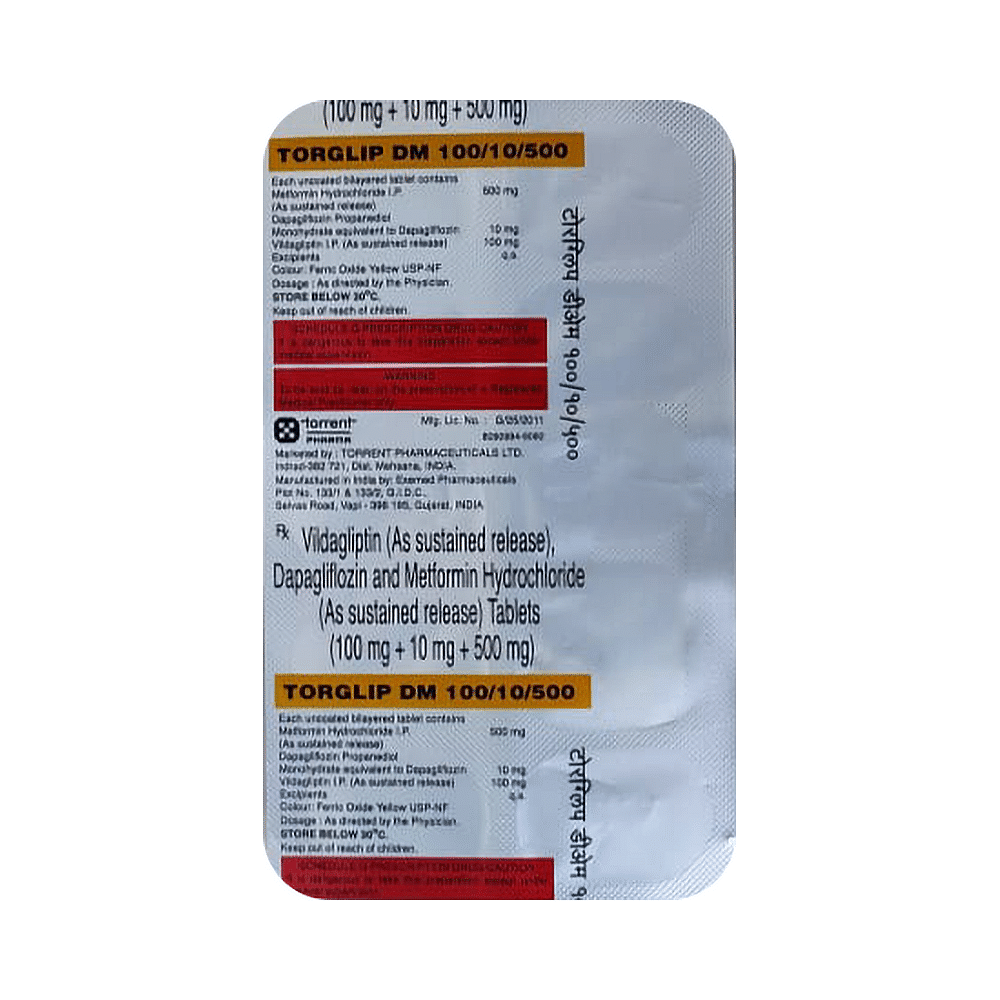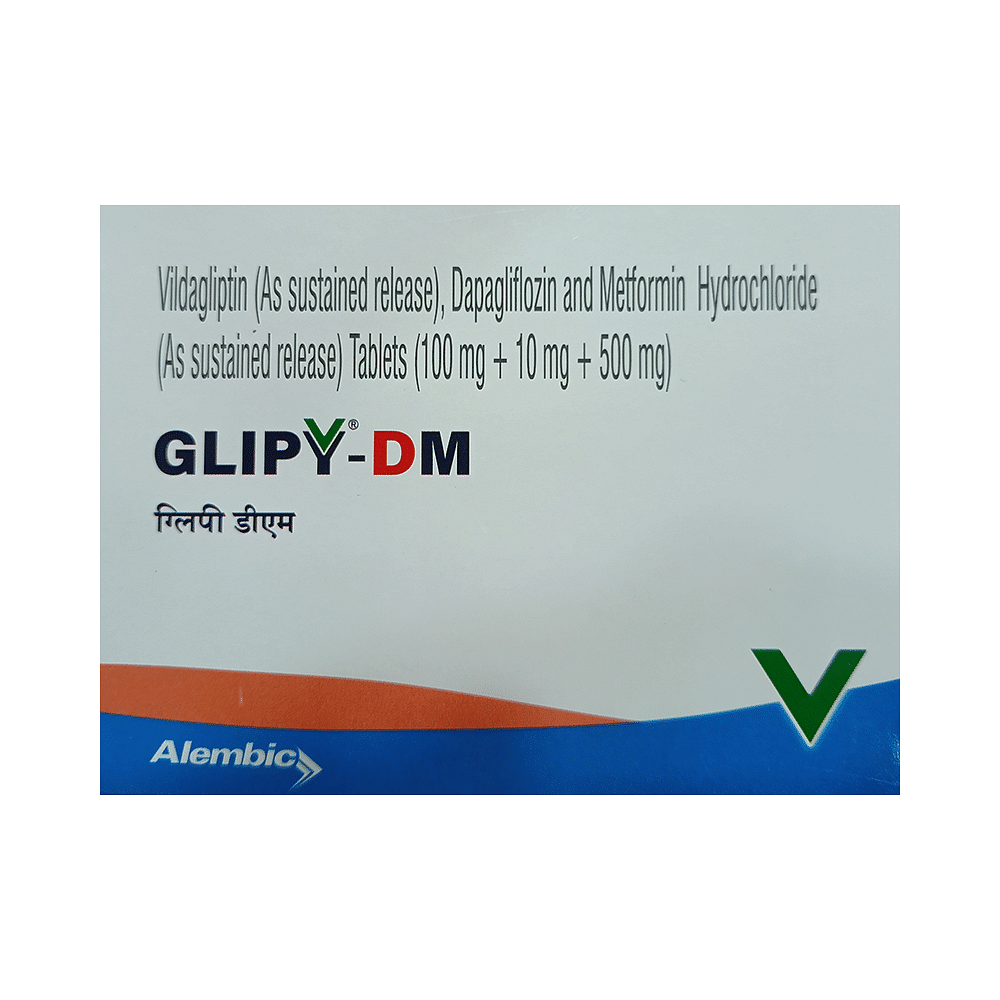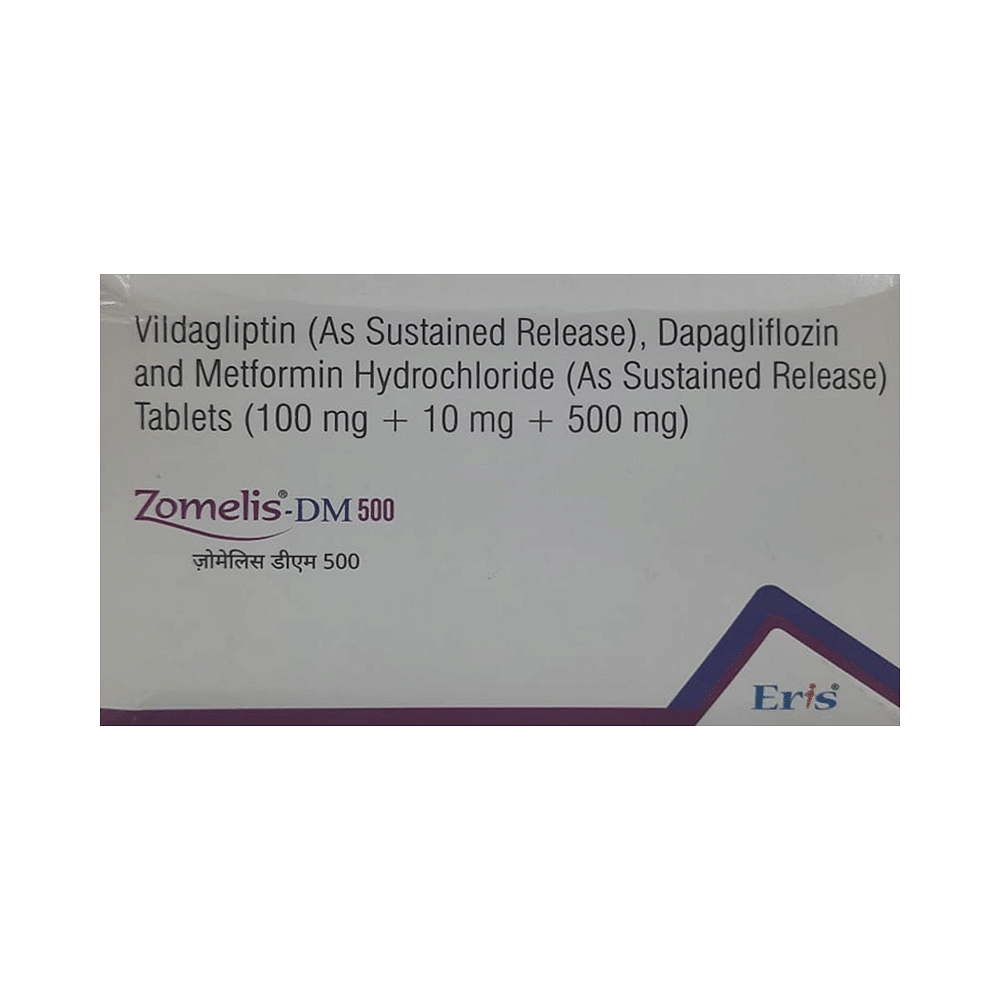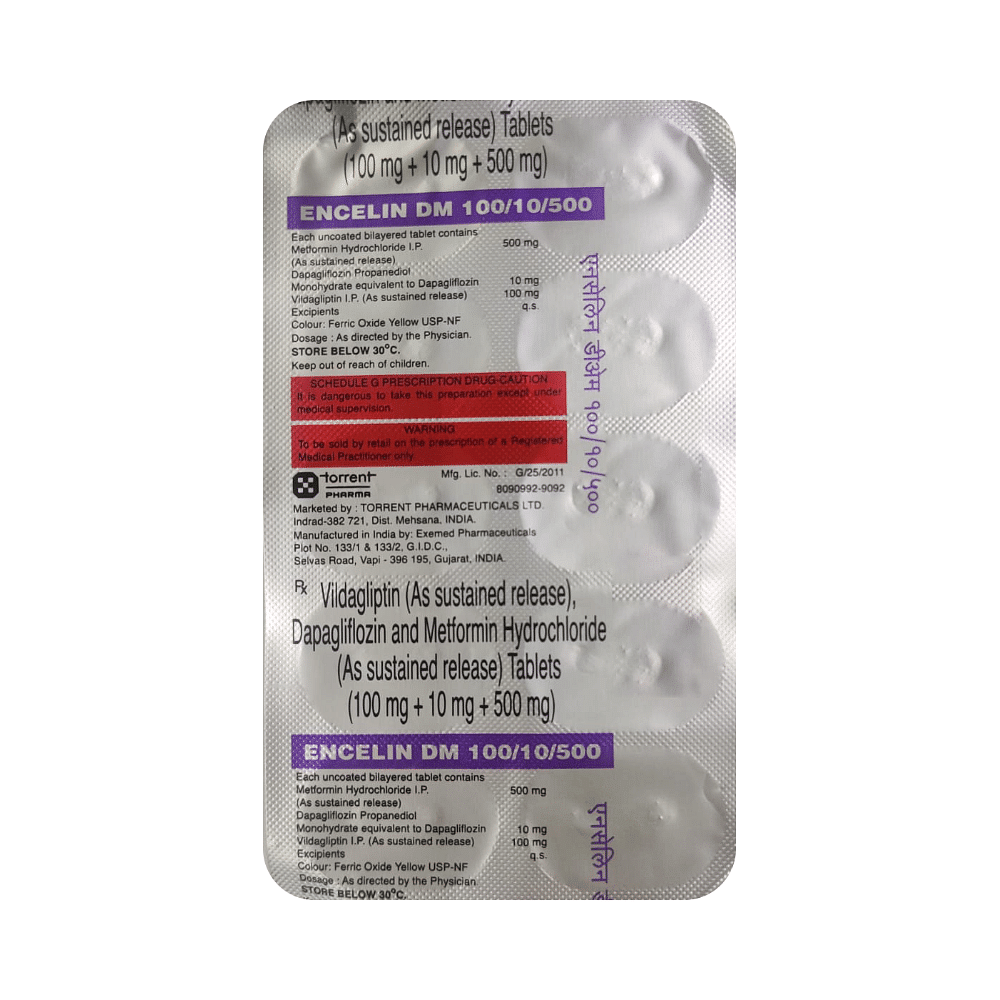
Dapaford VDM 10mg/500mg/100mg Tablet SR
Manufacturer
Leeford Healthcare Ltd
Salt Composition
Dapagliflozin (10mg) + Metformin (500mg) + Vildagliptin (0mg)
Key Information
Short Description
Dapaford VDM 10mg/500mg/100mg Tablet SR is a combination medicine that helps control blood sugar levels in adults with type 2 diabetes mellitus.
Dosage Form
Tablet SR
Introduction
Dapaford VDM 10mg/500mg/100mg Tablet SR is best taken with food. The dose will be decided by your doctor and don’t stop taking it unless the doctor advises otherwise. If stopped abruptly, your blood sugar levels may increase and can put you at risk of serious complications like kidney damage and blindness. This medicine is only part of a treatment program that should include a healthy diet, regular exercise, and weight reduction as advised by the doctor.
Directions for Use
Take this medicine in the dose and duration as advised by your doctor. Swallow it as a whole. Do not chew, crush or break it. Dapaford VDM 10mg/500mg/100mg Tablet SR is to be taken with food.
How it works
Dapaford VDM 10mg/500mg/100mg Tablet SR is a combination of three antidiabetic medicines. Dapagliflozin increases urinary glucose excretion and reduces blood glucose levels. Vildagliptin helps control blood sugar levels by increasing substances (incretins) in the body that make the pancreas release more insulin. It also signals the liver to stop producing sugar (glucose) when there is too much sugar in the blood. Metformin decreases the amount of glucose absorbed from your food and the amount of glucose made by the liver. It also increases the body's response to insulin, a natural substance that controls the amount of glucose in the blood.
Quick Tips
Your doctor will monitor your blood sugar levels regularly when you are taking Dapaford VDM 10mg/500mg/100mg Tablet SR. Hypoglycemia (low blood sugar level) may occur when Dapaford VDM 10mg/500mg/100mg Tablet SR is taken along with other antidiabetic medicines, or on delaying/skipping a meal. Check your blood sugar levels and have a snack/sugar source for immediate relief. If you get unusually thirsty, pass urine more frequently, and feel tired, let your doctor know. These are the signs of too much sugar in your blood and your dose may need adjusting. Lifestyle changes like a low-fat and salt diet, exercise, not smoking, and cutting down on the amount of alcohol you usually drink may help this medication work better.
Related Medicines

Torglip DM 100/10/500 Tablet SR

Glipy-DM Tablet SR

Dapzigard VDM Tablet SR

Zomelis-DM 500 Tablet SR

Encelin DM 100/10/500 Tablet SR
Frequently asked questions
Is Dapaford VDM 10mg/500mg/100mg Tablet SR safe for the kidneys?
Dapaford VDM 10mg/500mg/100mg Tablet SR is not associated with kidney damage. The kidneys process and clear the drug through urine. However, if your kidneys are not functioning properly, this medicine can increase the risk of lactic acidosis. Symptoms include fatigue, weakness, muscle pain, sleepiness, abdominal pain, and breathing difficulties. Seek immediate medical attention if you experience these symptoms.
Can Dapaford VDM 10mg/500mg/100mg Tablet SR cause dizziness?
Yes, Dapaford VDM 10mg/500mg/100mg Tablet SR can lower blood sugar levels and lead to dizziness if taken with other antidiabetic medications. If you experience dizziness, sit or lie down until the symptoms subside. Always carry some sugary snacks or fruit juice with you in case of travel-related dizziness. Regular monitoring of your blood sugar level is recommended.
Can this medicine be used to treat type 1 diabetes?
This medication is not intended for the treatment of type 1 diabetes or diabetic ketoacidosis (increased ketones in the blood or urine).
Can Dapaford VDM 10mg/500mg/100mg Tablet SR cause pancreatitis?
Reports of acute pancreatitis have been associated with Dapaford VDM 10mg/500mg/100mg Tablet SR. Patients are advised to discontinue the medication and contact their doctor if they experience persistent severe abdominal pain, sometimes radiating to the back.
What should I not eat while taking Dapaford VDM 10mg/500mg/100mg Tablet SR?
High levels of saturated and trans fats should be limited. Opt for fish and nuts as healthy fat sources. It is crucial to control your carbohydrate intake, which directly affects blood sugar levels.
Is Dapaford VDM 10mg/500mg/100mg Tablet SR tablet safe to use?
Yes, Dapaford VDM 10mg/500mg/100mg Tablet SR is considered safe when used as directed by the doctor. It may lead to side effects, however. For optimal results, adhere to your prescribed dosage and schedule.
Can I stop taking Dapaford VDM 10mg/500mg/100mg Tablet SR tablet?
No, do not stop using Dapaford VDM 10mg/500mg/100mg Tablet SR tablets without first consulting your doctor. Sudden discontinuation may worsen your diabetes and could lead to unforeseen complications.
Can people with diabetes have proteins?
Yes, protein is essential for individuals with diabetes. Include it along with other nutrients in their daily diet to support energy production and overall health. It breaks down into glucose to release energy after digestion, which may cause a slight spike in blood sugar levels.
Are artificial sweeteners good for people with diabetes?
No, artificial sweeteners are not recommended for individuals with diabetes. They are composed of chemicals that can lead to mild to severe side effects. Limiting or avoiding their use is generally advised.
Can diabetes cause kidney failure?
Yes, uncontrolled diabetes can result in kidney failure. Over time, the condition known as diabetic nephropathy may develop and ultimately lead to kidney failure in those with diabetes. It's vital to effectively manage diabetes through lifestyle changes, diet, regular blood sugar monitoring, and adherence to prescribed medications.
Can diabetes be cured?
Diabetes is a chronic condition that impacts blood glucose levels. While it cannot be completely cured, managing it with lifestyle changes, appropriate medication, and consistent self-care can effectively control the condition and help individuals live healthy lives.


